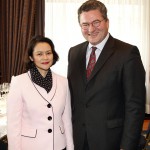- David Salomon (Director of Operation im Ritz Carlton), S.E. Jumaa Mubarak Al Junaibi (Botschafter Vereinigte Arabische Emirate)
beim Ambassadors Club Botschafter-Lunch mit dem Wehrbeauftragten Hellmut Koenigshaus im Ritz Carlton Berlin.
- Frank P. Kronisch (AUDI), I.E. Thi Hoang Anh Nguyen (Botschafterin Vietnam)
beim Ambassadors Club Botschafter-Lunch mit dem Wehrbeauftragten Hellmut Koenigshaus im Ritz Carlton Berlin.
- I.E. Maria Cleofe Natividad (Botschafterin Philippineni), S.E. Prinz Stefan von und zu Liechtenstein (Botschafter Liechtenstein)
beim Ambassadors Club Botschafter-Lunch mit dem Wehrbeauftragten Hellmut Koenigshaus im Ritz Carlton Berlin.
- S.E. Sven Staffan Carlsson (Botschafter Schweden), S.E. Per Poulsen-Hansen (Botschafter Daenemark)
beim Ambassadors Club Botschafter-Lunch mit dem Wehrbeauftragten Hellmut Koenigshaus im Ritz Carlton Berlin.
- Tischübersicht
beim Ambassadors Club Botschafter-Lunch mit dem Wehrbeauftragten Hellmut Koenigshaus im Ritz Carlton Berlin.
- Wehrbeauftragter Hellmut Koenigshaus am Rednerpult
beim Ambassadors Club Botschafter-Lunch mit dem Wehrbeauftragten Hellmut Koenigshaus im Ritz Carlton Berlin.
- r-l: Wehrbeauftragter Hellmut Koenigshaus, Mania Feilcke (Praesidentin Ambassadors Club e.V.)
beim Ambassadors Club Botschafter-Lunch mit dem Wehrbeauftragten Hellmut Koenigshaus im Ritz Carlton Berlin.
On 23 April, the commissioner for the armed forces of the German Bundestag, Hellmut Königshaus, was a guest of the Ambassadors Club at its regular meeting in Berlin’s Ritz Carlton. Herr Königshaus has held the office since 2010; before that, he was a member of the Bundestag for the FDP. The commissioner for the armed forces is appointed as an auxiliary institution of the Bundestag to exercise parliamentary control over the armed forces. Above all, he is commissioned to investigate possible violations of fundamental civil rights among the soldiers or violations of the basic principles of leadership development and civic education, and to report to parliament on the internal status of the Bundeswehr.
In an agreeable atmosphere, the qualified jurist provided the ambassadors in attendance – just under 30 in number – with a comprehensive insight into the genesis and the current tasks and rights of the commissioner for the armed forces, also against the backdrop of the changing requirements made of soldiers deployed abroad. Herr Königshaus underlined the uniqueness of the institution of the commissioner for the armed forces, in view of its creation during German rearmament following the Second World War, also referring to its role-model effect for other states. Similar institutions for example, such as that of the ombudsman, are in many countries oriented toward that of the commissioner for the armed forces. After the end of the civil war, indeed, Bosnia and Herzegovina elected to adopt a copy of the German model which was accurate down to the last detail.
The commitment of the Bundeswehr as a parliamentary army and the protection of the fundamental rights of its soldiers as ‘citizens in uniform’ met with keen interest among Their Excellencies. The requirements arising from this as they relate to the structuring of deployment abroad, for example as regards the duration of that deployment for individual soldiers and the opportunities they have to make contact with their family, played just as much of a role as the question of appropriate armament in case of conflict. The ambassadors took full advantage of the opportunity to ask questions and participate in a discussion.
Their interest here focused particularly on issues involving civil and military jurisdiction, the role of women in the armed forces and those issues, if any, which were currently causing the most complaints from soldiers. Those present were also able to discuss the reform of the Bundeswehr from an army with compulsory military service to a professional army, and the opportunities provided and risks posed by that transformation for other armed forces.
Pictures: Agentur Baganz







